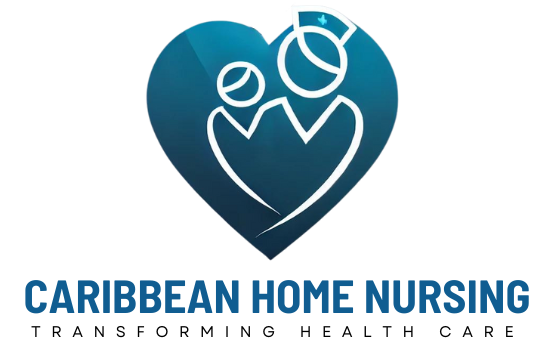The role of home healthcare in Trinidad and Tobago has grown significantly, driven by several key factors. One of the most prominent reasons for the increased demand for home healthcare is the rising elderly population. According to reports, Trinidad and Tobago has an aging population, with a substantial portion of the population over the age of 60. Elderly individuals often face chronic illnesses, mobility issues, and a need for daily assistance, making home healthcare a viable and effective solution.
Another critical factor contributing to the demand is the growing prevalence of non-communicable diseases (NCDs) such as diabetes, hypertension, and heart disease. These chronic conditions often require long-term management, including medication, monitoring, and regular care. For many families, the option of having healthcare services delivered at home is not only convenient but also enhances the patient’s overall well-being by allowing them to stay in a familiar environment.
Benefits of Home Healthcare in Trinidad and Tobago

Home healthcare offers several advantages, not only for patients but also for their families. Some of the key benefits include:
Comfort and Convenience
One of the primary benefits of home healthcare is the ability to receive care in a comfortable and familiar environment. Patients feel more at ease at home, surrounded by loved ones, which contributes to faster recovery and better mental health. This is particularly important for elderly patients or those recovering from surgery or long-term illnesses.
Personalized Care
Home healthcare services are highly personalized, meaning that the care plan is tailored to the specific needs of the patient. The care team works closely with the patient and their family to understand the patient’s medical condition, preferences, and requirements, ensuring they receive the most appropriate care.
Cost-Effective Care
Compared to hospital stays or long-term care facilities, home healthcare can be more cost-effective. In Trinidad and Tobago, where healthcare costs are a concern for many families, home healthcare provides an affordable alternative without compromising on the quality of care. Patients receive the same level of medical attention without the high costs associated with in-patient care.
Reduced Risk of Infections
Hospitals and other medical facilities often carry a higher risk of infections due to the presence of multiple patients with various illnesses. Receiving care at home significantly reduces the risk of hospital-acquired infections, which is particularly important for immunocompromised individuals or those with chronic illnesses.
Family Involvement
Home healthcare allows family members to be more involved in the care process. In Trinidad and Tobago, where family ties are strong, this level of involvement is crucial. Family members can participate in the patient’s care, provide emotional support, and work closely with healthcare professionals to ensure the best outcomes.
Types of Home Healthcare Services in Trinidad and Tobago

In Trinidad and Tobago, home healthcare providers offer a wide range of services to meet the diverse needs of patients. Some of the common services include:
Nursing Care
Nursing care is one of the most commonly provided home healthcare services. Licensed nurses visit patients in their homes to administer medications, monitor vital signs, provide wound care, and manage chronic conditions like diabetes or hypertension. They also educate patients and their families on disease management and medication adherence.
Personal Care Assistance
Personal care assistance helps individuals with daily activities such as bathing, dressing, eating, and mobility. This type of care is particularly important for elderly patients or those with disabilities who may struggle to perform these tasks independently.
Physical and Occupational Therapy
Physical therapists help patients recover from injuries, surgeries, or conditions that affect their mobility. Occupational therapists focus on helping patients regain independence in performing daily activities, such as using adaptive equipment or modifying their home environment to accommodate their needs.
Speech Therapy
Speech therapy is provided to patients who have difficulty with speech or swallowing, often due to stroke, neurological conditions, or trauma. Speech therapists work with patients to improve communication skills and swallowing function.
Palliative and Hospice Care
Palliative care focuses on improving the quality of life for patients with serious illnesses by managing symptoms and providing emotional support. Hospice care is similar but is specifically for patients who are in the final stages of a terminal illness. Both types of care aim to provide comfort and dignity to patients during their final days.
Medication Management
Medication management is crucial for patients who are on multiple medications or who may have difficulty adhering to their medication schedules. Home healthcare providers can ensure that patients take their medications correctly and on time, preventing complications and hospital readmissions.
Challenges of Home Healthcare in Trinidad and Tobago

Despite the numerous benefits, home healthcare in Trinidad and Tobago faces several challenges. Addressing these challenges is key to ensuring the continued growth and effectiveness of the sector.
Limited Availability of Trained Professionals
One of the primary challenges is the shortage of trained healthcare professionals, including nurses, therapists, and caregivers. While Trinidad and Tobago has made significant strides in training healthcare workers, there is still a need for more professionals to meet the growing demand for home healthcare services.
Cost and Affordability
Although home healthcare is generally more cost-effective than in-patient care, affordability remains a concern for many families in Trinidad and Tobago. Healthcare costs can add up over time, particularly for long-term or specialized care. Ensuring that home healthcare is accessible to all segments of the population will require greater governmental support and possibly subsidies.
Geographic Challenges
Trinidad and Tobago consists of two islands, and providing home healthcare services to remote or rural areas can be logistically challenging. Some regions may lack access to healthcare professionals or necessary equipment, making it difficult to deliver consistent care across the islands.
Awareness and Education
Many people in Trinidad and Tobago may not be fully aware of the benefits of home healthcare or how to access these services. Increasing public awareness and education on the availability and advantages of home healthcare can help more people make informed decisions about their care options.
The Future of Home Healthcare in Trinidad and Tobago

As the healthcare landscape continues to evolve, the future of home healthcare in Trinidad and Tobago looks promising. Several trends are expected to shape the future of the industry, including technological advancements, policy changes, and the growing recognition of home healthcare’s importance.
Technological Advancements
Technology is playing an increasingly important role in home healthcare. Telemedicine, for example, allows healthcare providers to monitor patients remotely, reducing the need for in-person visits. This can be particularly beneficial for patients in rural areas or those with mobility issues. Additionally, advancements in medical equipment, such as portable diagnostic devices, can make it easier for healthcare professionals to provide high-quality care at home.
Government Support and Policy Changes
Government support is essential for the continued growth of home healthcare in Trinidad and Tobago. Policies that promote training and recruitment of healthcare professionals, as well as subsidies for home healthcare services, can help address some of the challenges faced by the industry. Additionally, regulatory frameworks that ensure the quality and safety of home healthcare services will be crucial as the sector expands.
Integrated Care Models
The future of home healthcare in Trinidad and Tobago may also involve more integrated care models, where home healthcare providers work closely with hospitals, clinics, and other healthcare institutions to provide seamless care across different settings. This approach can help improve patient outcomes and reduce the burden on hospitals by ensuring that patients receive appropriate care at home.
How to Choose the Right Home Healthcare Provider in Trinidad and Tobago

Selecting the right home healthcare provider is a critical decision that can significantly impact the quality of care you or your loved one receives. Here are some factors to consider when choosing a provider in Trinidad and Tobago:
Licensing and Accreditation
Ensure that the home healthcare provider is licensed and accredited by the relevant authorities in Trinidad and Tobago. This guarantees that the provider meets specific standards of care and adheres to regulations designed to protect patients.
Experience and Expertise
Look for a provider with a proven track record and experience in delivering home healthcare services. Ask about the qualifications of their healthcare professionals, including nurses, therapists, and caregivers, to ensure they are equipped to meet your specific needs.
Range of Services
Different home healthcare providers offer different services, so it’s essential to choose one that offers the services you or your loved one needs. Whether it’s nursing care, physical therapy, or palliative care, ensure the provider can deliver the necessary support.
Personalized Care Plans
A good home healthcare provider should develop personalized care plans that take into account the patient’s medical history, current condition, and specific needs. Ask about how they assess patients and develop individualized care plans.
Communication and Support
Effective communication is vital in home healthcare. Choose a provider who maintains open lines of communication with both the patient and their family, keeping everyone informed about the patient’s progress and any changes in their care plan.
Home Healthcare Versus Traditional Healthcare Facilities

When considering the best care options for yourself or a loved one, it’s important to understand the key differences between home healthcare and traditional healthcare facilities like hospitals or nursing homes. Both have their advantages, but home healthcare is often the preferred choice for those who value comfort, independence, and personalized care.
Personalized Attention
One of the main advantages of home healthcare is the high level of personalized attention that patients receive. In a hospital or nursing home, healthcare professionals often have to divide their time and attention among multiple patients, making it harder to provide individualized care. In contrast, home healthcare is one-on-one, allowing for a more personalized and focused approach. The healthcare provider is entirely dedicated to the patient during their visit, which can lead to better outcomes and a higher quality of care.
Independence and Comfort
For many individuals, especially the elderly, maintaining independence is a significant factor in their quality of life. Home healthcare allows patients to remain in familiar surroundings, where they feel safe and comfortable. This sense of independence can have a positive impact on mental health and recovery. In contrast, staying in a hospital or long-term care facility can feel isolating and disruptive, particularly for those who value their personal space and routine.
Lower Costs
As mentioned earlier, home healthcare is generally more cost-effective than staying in a hospital or nursing home. In Trinidad and Tobago, where healthcare costs can be a concern for many families, home healthcare presents a more affordable option without sacrificing quality. Patients only pay for the services they need, and there are no added costs for accommodation, meals, or facility overheads.
Flexibility in Scheduling
With home healthcare, patients and their families have greater control over scheduling. Healthcare visits can be arranged at times that are convenient for the patient, ensuring that the care provided fits seamlessly into their daily routine. In contrast, healthcare facilities often operate on strict schedules, leaving little room for flexibility.
Emotional and Psychological Well-being
The emotional and psychological well-being of a patient is crucial to their overall recovery. Home healthcare provides an environment that supports emotional stability by allowing patients to stay close to their loved ones. In Trinidad and Tobago, where family culture is strong, the presence of family members during care can have a significant positive impact on the patient’s mental and emotional health. Being surrounded by familiar faces in a comfortable environment can reduce anxiety, promote healing, and improve the patient’s outlook.
The Role of Family in Home Healthcare
In Trinidad and Tobago, family plays a central role in the caregiving process, especially when it comes to home healthcare. Many families take an active role in providing care, offering emotional support, and managing the logistics of care coordination. The strong sense of family duty in the country is one of the reasons why home healthcare has become a preferred option for many individuals.
Collaborative Caregiving
Home healthcare allows family members to collaborate closely with healthcare professionals. This collaboration ensures that the patient receives well-rounded care that addresses both medical and emotional needs. Family members often assist with basic care tasks such as meal preparation, medication reminders, and mobility assistance, while trained professionals handle more complex medical tasks. This team-based approach helps to reduce the burden on any one individual while ensuring comprehensive care.
Training for Family Caregivers
Many home healthcare providers in Trinidad and Tobago offer training and education to family members, enabling them to take on certain caregiving responsibilities. This training can include instruction on how to administer medication, monitor vital signs, and assist with mobility. By empowering family members with the necessary skills, home healthcare providers ensure that patients receive continuous care even when professionals are not present.
Emotional Support
In many cases, family members provide invaluable emotional support to patients. They offer companionship, conversation, and a sense of normalcy that can make a significant difference in the patient’s recovery and overall well-being. Emotional support is particularly important for elderly patients, who may feel lonely or disconnected from their community. The presence of family members can help reduce feelings of isolation and boost the patient’s morale.
Technology and Home Healthcare in Trinidad and Tobago

Technological advancements have revolutionized the way healthcare is delivered, and home healthcare is no exception. In Trinidad and Tobago, healthcare providers are increasingly adopting new technologies to enhance the quality and efficiency of home healthcare services. These innovations are helping to bridge gaps in care, improve communication, and enable remote monitoring.
Telemedicine and Remote Consultations
Telemedicine has become a valuable tool in the delivery of home healthcare services. It allows healthcare professionals to conduct virtual consultations with patients, assess their condition, and provide medical advice without needing to be physically present. For patients in rural or remote areas of Trinidad and Tobago, telemedicine can be a lifeline, ensuring they receive timely medical attention despite geographic challenges.
Telemedicine also enables family members to participate in consultations, ask questions, and stay informed about the patient’s care plan. This collaborative approach helps to ensure that everyone involved in the patient’s care is on the same page.
Remote Monitoring Devices
Remote monitoring devices are another technological innovation that is transforming home healthcare. These devices allow healthcare providers to monitor a patient’s vital signs, such as blood pressure, heart rate, and oxygen levels, from a distance. Data is transmitted in real-time to healthcare professionals, who can intervene if they detect any irregularities. This proactive approach helps to prevent complications and hospitalizations, particularly for patients with chronic conditions.
For example, a patient with diabetes may use a continuous glucose monitor (CGM) that tracks their blood sugar levels throughout the day. The data is automatically sent to their healthcare provider, who can adjust the patient’s treatment plan if needed. This level of monitoring provides peace of mind for both patients and their families.
Mobile Health Apps
Mobile health apps are becoming increasingly popular in Trinidad and Tobago, offering patients and caregivers a convenient way to manage healthcare tasks. These apps can be used to schedule appointments, track medications, set reminders, and communicate with healthcare providers. Some apps even offer features such as symptom tracking and educational resources, helping patients stay informed about their condition.
By leveraging mobile health apps, home healthcare providers can improve the overall efficiency of care and ensure that patients remain engaged in their treatment plan.
Home Healthcare for Chronic Disease Management in Trinidad and Tobago

Chronic diseases are a major health concern in Trinidad and Tobago, with conditions such as diabetes, hypertension, and cardiovascular disease affecting a significant portion of the population. Home healthcare plays a crucial role in helping individuals manage these conditions and maintain a good quality of life.
Diabetes Care
Diabetes is one of the most prevalent chronic diseases in Trinidad and Tobago. Home healthcare providers can assist patients with diabetes by monitoring their blood sugar levels, administering insulin injections, and providing education on proper nutrition and lifestyle changes. Regular monitoring and education are essential for preventing complications such as diabetic foot ulcers or vision problems.
In addition, home healthcare professionals work closely with patients to develop a personalized care plan that includes medication management, dietary recommendations, and exercise routines. By receiving consistent support at home, patients are more likely to stay on track with their diabetes management and avoid hospitalizations.
Hypertension and Cardiovascular Disease Management
Hypertension, or high blood pressure, is another widespread condition in Trinidad and Tobago. Uncontrolled hypertension can lead to serious complications such as stroke, heart attack, and kidney disease. Home healthcare providers help patients monitor their blood pressure, adjust their medications as needed, and provide guidance on lifestyle changes such as reducing salt intake and increasing physical activity.
For patients with cardiovascular disease, home healthcare can include rehabilitation services such as physical therapy, as well as regular monitoring of heart health. By receiving care in a familiar environment, patients are more likely to adhere to their treatment plans and avoid unnecessary hospitalizations.
Palliative Care for Chronic Conditions
For patients with advanced or terminal chronic conditions, palliative care is an essential component of home healthcare. Palliative care focuses on managing symptoms, relieving pain, and improving the patient’s overall quality of life. Home healthcare providers work with patients and their families to develop a care plan that addresses their physical, emotional, and spiritual needs.
Palliative care can be particularly beneficial for patients with conditions such as cancer, chronic obstructive pulmonary disease (COPD), or heart failure. By providing comfort and support at home, patients are able to spend their remaining time in a familiar environment surrounded by loved ones.
How Home Healthcare Providers in Trinidad and Tobago Ensure Quality Care
Providing high-quality home healthcare requires a combination of skilled professionals, thorough care plans, and ongoing communication. Home healthcare providers in Trinidad and Tobago are committed to ensuring that patients receive the best possible care by implementing several key strategies.
Comprehensive Assessments
Before starting home healthcare services, providers conduct a comprehensive assessment of the patient’s medical condition, needs, and preferences. This assessment includes a review of the patient’s medical history, current medications, physical abilities, and social support network. Based on this information, the healthcare team develops a personalized care plan that outlines the services needed and sets specific goals for the patient’s care.
Ongoing Monitoring and Adjustments
Home healthcare providers continually monitor the patient’s progress and adjust the care plan as needed. Regular check-ins, either in-person or through telemedicine, allow the healthcare team to assess the patient’s condition and make any necessary changes to their treatment. This proactive approach helps to prevent complications and ensures that the patient is receiving the most appropriate care at all times.
Coordination with Other Healthcare Providers
In many cases, home healthcare providers work closely with the patient’s other healthcare providers, such as doctors, specialists, and pharmacists. This coordination ensures that all aspects of the patient’s care are aligned, and there is a seamless flow of information between different members of the healthcare team. For example, if a patient’s primary care doctor prescribes a new medication, the home healthcare provider can ensure that it is administered correctly and monitor for any potential side effects.
Patient and Family Education
Education is a critical component of home healthcare. Providers take the time to educate patients and their families about the patient’s condition, treatment plan, and how to manage their care at home. This education empowers patients to take an active role in their health and ensures that they understand how to manage their medications, monitor their symptoms, and perform any necessary care tasks.
Use of Evidence-Based Practices
Home healthcare providers in Trinidad and Tobago are committed to using evidence-based practices to deliver the highest standard of care. This means that they rely on proven methods and treatments that have been shown to be effective through research and clinical trials. By staying up to date with the latest developments in healthcare, providers can offer patients the most effective care options available.
FAQ based on Home healthcare in Trinidad and Tobago

Q. What is home healthcare?
Ans. Home healthcare involves professional medical services provided to patients in their homes, such as nursing care, therapy, and personal assistance, tailored to their individual needs.
Q. What services are offered in home healthcare in Trinidad and Tobago?
Ans. Home healthcare services include nursing care, chronic illness management, physical and occupational therapy, palliative care, wound care, IV therapy, and medication management.
Q. Who can benefit from home healthcare?
Ans. Home healthcare benefits elderly individuals, patients with chronic illnesses, those recovering from surgery, and individuals needing personalized care in a familiar environment.
Q. How does home healthcare improve quality of life?
Ans. Home healthcare improves quality of life by offering comfort, reducing the risk of hospital-acquired infections, and providing personalized care in the patient’s own home.
Q. What are the advantages of home healthcare over hospital care?
Ans. Home healthcare offers personalized attention, independence, lower costs, flexibility in scheduling, and reduced infection risks compared to hospital stays.
Q. Is home healthcare in Trinidad and Tobago affordable?
Ans. Yes, home healthcare is generally more cost-effective than in-patient care, offering quality care without the high costs associated with hospital stays.
Q. Can family members be involved in home healthcare?
Ans. Yes, family members can play an active role in caregiving and are often trained by healthcare providers to assist with basic tasks like medication reminders and mobility support.
Q. How does technology improve home healthcare?
Ans. Technological advancements like telemedicine, remote monitoring devices, and mobile health apps enable better care coordination and real-time monitoring for home healthcare patients.
Q. What conditions can be managed with home healthcare?
Ans. Home healthcare can help manage chronic conditions such as diabetes, hypertension, cardiovascular diseases, and provide palliative care for serious illnesses.
Q. How do I choose the right home healthcare provider in Trinidad and Tobago?
Ans. Look for licensed providers with experience, a wide range of services, personalized care plans, and a strong track record of communication and support.
Conclusion
Home healthcare in Trinidad and Tobago is an invaluable service that offers personalized, cost-effective, and high-quality care to individuals who need medical attention in the comfort of their own homes. As the demand for these services continues to grow, home healthcare providers are stepping up to meet the needs of the population by offering a wide range of services, from nursing care and therapy to chronic disease management and palliative care.
With the right support from family members, healthcare professionals, and technological advancements, patients in Trinidad and Tobago can enjoy better health outcomes, greater independence, and a higher quality of life. Whether you’re managing a chronic condition, recovering from surgery, or simply in need of some extra help with daily activities, home healthcare offers a compassionate and effective solution that keeps you close to the people and places you love most.







